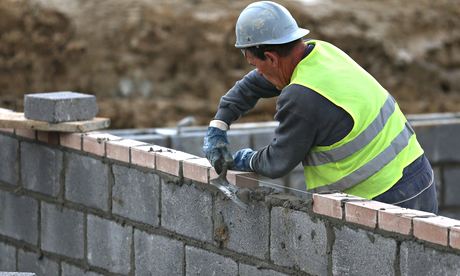
Cardy/Getty Images
In parts of London, the ratio of house prices to average
earnings is now 20 to one or even higher, and hardly a day goes by without
stories of new luxury flats being snapped up by rich foreigners, who intend to
hold them as investments rather than actually living in them – or even letting
them out. Meanwhile, elsewhere in the UK, ministers are intending to relax the
requirements for new developments to include “affordable” housing.
And new “garden cities” won’t have to include
any affordable homes at all. So does the UK face a crisis of
“housing affordability”?
For economists, this is an odd question. Of course houses
are “affordable”: there’s a market, and people buy and sell them at
prices that, by definition, they can afford, at least for now. The complaint is
not that nobody can “afford” to buy a house in Kensington, Cambridge,
or the places that people most want to live. Instead, it’s that too many people
can afford to pay too much, and that prices are therefore too high, meaning
that many other people have to live in accommodation that is either less
conveniently located or smaller and less comfortable than they would like.
That on its own isn’t enough to prove there’s a problem,
though – by that measure, Michelin-starred restaurants are “too expensive”,
since I, and many others, can’t eat in them as much as I’d like. But housing is
different. The high price of housing has negative consequences, both economic
and social. It inhibits both labour mobility and social mobility, and hence
makes us a poorer and more unequal society. While the national ratio of
unemployed people to vacancies is still about four to one, in some northern
cities it is 10 to one, while in Cambridge there are far more vacancies than
jobseekers.
But who can afford to move from Middlesbrough to
Cambridge? With more, and hence cheaper, houses, Cambridge would grow much
faster, providing good jobs for people currently unemployed elsewhere.
Put like that, the response from market-oriented
economists – and I’d include myself here – is simple. Requirements for
affordable housing in new developments may or may not be desirable for other
reasons (creating mixed communities) but they are largely irrelevant to the
wider question. Similarly, there is a very strong case for allowing councils to
borrow more to build social housing where there is demand; but this will help
primarily by expanding the overall housing supply.
The bottom line is that if we, as a society, want lower
house prices, especially in the places where the jobs are, the answer is
simple. Build more houses: lots more. And to do that we need to address the
reason why the market isn’t building more houses already. There are obvious
market failures: land near Cambridge might be worth £20,000 a hectare as
farmland, but with planning permission for housing it would be worth more than 100 times
that.
Doing something about this doesn’t mean concreting over
England –only a little over 2% of England (let alone the UK) is actually built
on.
There is another argument. Danny Dorling suggests that the problem is not that we don’t
have enough houses, but that they’re poorly distributed; we have more bedrooms
per person than ever before, but the richest 10% have five times as many as the
poorest. He argues for a land tax and an increased, much more progressive
council tax, to encourage housing to be used more equitably and efficiently.
But these are complementary, not alternative strategies.
Building more houses would reduce the price of existing ones, and hence in
itself would make the UK a less unequal society. So would higher taxes on land
and property. And both would make it less attractive to leave properties empty
as an investment rather than using them productively by letting them out.
The good news is that, after decades in which the general
consensus appeared to be that (in contrast to all other types of inflation)
house price inflation was somehow a good thing because it made people feel
richer, there now is a growing realisation that it redistributes money from the
young and the poor to the old and the rich, making us a less equal and less
dynamic society.
The answer is not tinkering around the edges with “affordable”
housing or crackdowns on absentee foreign buyers in Knightsbridge – it is a
combination of direct government action to build more houses; reforms to
planning and regulation to let the market work; and higher taxes to
redistribute the windfall gains that have benefited those who need it least.
*
To read this news from its original source, click here.